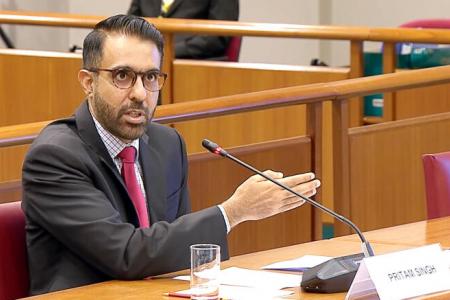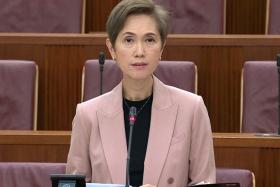What next in the Raeesah Khan saga, and what could happen to Pritam Singh?
Parliament's privileges committee on Thursday (Feb 10) submitted a 1,180-page report of its investigations into the conduct of former Workers' Party MP Raeesah Khan, who had admitted to lying to the House.
The eight-member panel, which listened to the evidence of nine witnesses over 31 hours of hearings in December last year, called for Ms Khan to be fined a total of $35,000 for lying in Parliament last August and October.
The committee, which had heard evidence from WP chief Pritam Singh and party vice-chairman Faisal Manap, also concluded that Mr Singh had lied under oath and Mr Faisal had flagrantly refused to answer relevant questions, which could possibly amount to criminal offences.
The report called for Mr Singh and Mr Faisal to be referred to public prosecutors for further investigations.
What are the powers of Parliament's privileges committee?
Based on the Standing Orders, or rules of Parliament, the committee's deliberations are confined to the matter referred to it, unless Parliament decides to extend or limit its remit.
In this case, the committee was convened to look into Ms Khan's repeated lie to the House.
The committee noted in its report that it does not have the purview to specifically recommend penalties for Mr Singh, Mr Faisal as well as party chairman Sylvia Lim. Nevertheless, it set out recommendations related to the three after finding that they had played a role in Ms Khan's continued lie.
Besides calling for Mr Singh and Mr Faisal to be referred to the Public Prosecutor, it said the three WP leaders had also been dishonourable in conduct and in contempt of Parliament.
Ultimately, though, it is Parliament, and not the committee, that will decide on the actual sanctions to be meted out.
Why did the committee recommend that the WP leaders be referred to the Public Prosecutor, and not Ms Khan, who told the lie?
Singapore Management University Associate Professor Eugene Tan said Ms Khan had breached parliamentary privilege by lying in Parliament during her speech.
In contrast, the committee concluded that Mr Singh had lied on affirmation - or oath - to the committee. This goes beyond breaching parliamentary privilege and moved "into the realm of criminal wrongdoing", he said.
Under the Parliament (Privileges, Immunities and Powers) Act, Parliament can refer a matter to the Public Prosecutor when an MP has committed 18 specific offences listed in Section 31. Among them is for "wilfully (making) a false answer to any question material to the subject of inquiry put during examination before Parliament or a committee".
Breach of parliamentary privilege is not included in the list.
Hence, he added, Mr Singh's misconduct "is far more serious" compared with Ms Khan's.
Assoc Prof Tan also noted that Ms Khan had admitted to lying in Parliament, whereas Mr Singh had maintained during the hearings that he was telling the truth.
He said going through a prosecutorial process would be seen to be fairer by the public, since Mr Singh would have the opportunity to defend himself in court, rather than be subject to a parliamentary process in a People's Action Party-dominated Parliament.
Meanwhile, Mr Faisal had refused to answer relevant questions during the committee's hearings, despite being reminded that doing so could amount to an offence and contempt of Parliament.
Under Section 31 of the Act, it is an offence to refuse to answer any lawful or relevant question put by Parliament or any committee, and to prevaricate as a witness before Parliament or a committee.
What happens now?
The committee's report will be debated when Parliament sits next week. Word has it that this will take place next Tuesday (Feb 15).
WP's leaders have said they will speak at the debate. At the end of it, Parliament will have to decide if it accepts the committee's findings and conclusions, and the matter will be put to a vote by the House.
Parliament can choose to accept or reject the recommendations, or opt to amend them before accepting them.
For such a vote on the committee's report, only a simple majority is needed.
What happens if Parliament accepts the committee's recommendations?
The committee has recommended that Ms Khan be fined $25,000 for stating an untruth in Parliament on Aug 3 last year, and $10,000 for repeating it on Oct 4, and Parliament will impose these fines.
Parliament will also refer Mr Singh and Mr Faisal to the Public Prosecutor - that is, the Attorney-General's Chambers - for further investigations into whether there ought to be criminal proceedings against them.
What will the Public Prosecutor do?
The Public Prosecutor has a constitutional duty to investigate if criminal wrongdoing is suspected.
Criminal Lawyer Sunil Sudheesan said this makes for a more thorough investigation process as the Public Prosecutor will be able to, say, direct the police to collect more evidence by looking through phone or e-mail records.
After investigations are complete, the Public Prosecutor will then have to decide if the case is compelling enough to proceed with a charge, he said.
What happens if the men face criminal charges?
If Mr Singh and Mr Faisal are eventually charged, they will get to defend themselves in court with legal counsel.
SMU's Assoc Prof Tan said that based on the committee's findings, a possible offence could have been committed under Section 193 of the Penal Code, which deals with false evidence.
Under the law, a person who intentionally gives or fabricates false evidence can be jailed for up to three years and fined.
Can Parliament also take action against the three WP leaders?
Under the Parliament (Privileges, Immunities and Powers) Act, Parliament has the powers to deal with unacceptable conduct on its own, and can impose sanctions, including jail sentences, fines and suspensions or even expulsions.
The committee said in its report that the actions of Mr Singh, Mr Faisal and Ms Lim could amount to dishonourable conduct or contempt.
For these offences, Parliament can order an MP to be jailed for a period not more than his remaining term, impose a fine of up to $50,000, suspend him for a period not more than the remainder of the current session of Parliament, and ask the Speaker of Parliament to reprimand or admonish him.
The committee has recommended that Parliament consider deferring any action with regard to the three MP's conduct until any criminal proceedings are complete.
How different is the public prosecutorial process versus the parliamentary process?
Parliament can summarily decide on the punishments to mete out to the three WP leaders, based on the committee's findings and conclusions.
It can also convene the committee again to look into their conduct, similar to the process Ms Khan went through. Once the committee has made its findings, it will then recommend a course of action to take, and Parliament will have to debate the matter.
Prof Tan said the worst punishments that Parliament can mete out are expulsion, and jail or suspension for a term not exceeding the session of Parliament. But the MPs will not be disqualified from standing for elections in future.
If referred to a public prosecutor, and charged, Mr Singh and Mr Faisal will go through a criminal trial, and the courts will decide if they are guilty or innocent. They can be represented by legal counsel in this process, which they do not have under the parliamentary process.
The punishments they are subject to will depend on what offence they are charged with.
However, if they are convicted of an offence in court and jailed for at least one year, or fined at least $2,000, they will lose their parliamentary seats and also be disqualified from standing as an MP for five years.
The disqualification ceases at the end of five years from the end of the jail term, or from the date the fine was imposed.
See the full report released by the Committee of Privileges.
Get The New Paper on your phone with the free TNP app. Download from the Apple App Store or Google Play Store now


